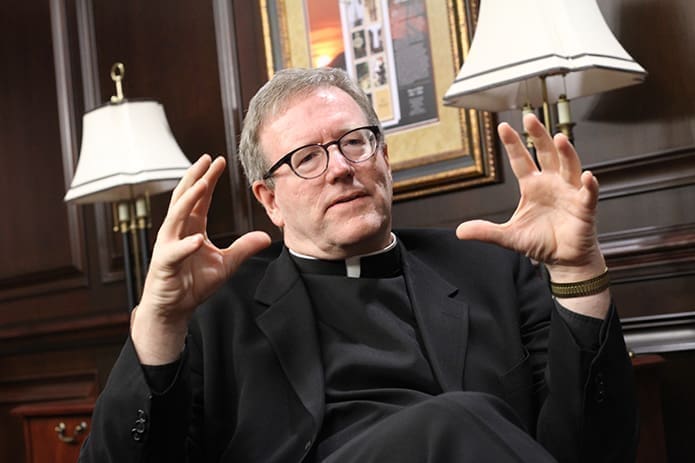 Photo By Michael Alexander
Photo By Michael AlexanderAtlanta
‘Catholicism’ creator likes new media’s impact ‘way outside’ church walls
By ANDREW NELSON, Staff Writer | Published November 7, 2013
SMYRNA—Another grand, sweeping documentary on Catholicism is being dreamed by Chicago priest Father Robert Barron.
It’s the latest goal for the priest who more than a dozen years ago was asked to jump-start an evangelical endeavor to “invade that space” where the church’s message was not often heard.
“If you want to reach people who are under 40, you have to use media. Things like YouTube had just come into being and we jumped into that with two feet,” said Father Barron. “If you want to find the unchurched Catholics and the secularists, you aren’t going to find them by staying in church and inviting them to programs. You have to use this new means. We have to invade that space.”
The author of 10 books and a weekly radio commentator, Father Barron brings to YouTube and the web a Catholic perspective on mainstream cultural events, from blockbuster movies like “World War Z” to gay marriage. He’s posted more than 180 videos online and his viewers have topped a million.
Father Barron in 2000 founded the nonprofit Word on Fire that supports his efforts to draw people to the Catholic faith through new media. According to tax records, the nonprofit in 2011 had nearly $5 million in revenue generated by his diverse teaching tools, funds that go to support the mission of Word on Fire.
He’s like today’s Bishop Fulton Sheen. Always the teacher, often in his videos Father Barron sits in front of a bookcase, wearing a Roman collar. He’ll dissect the latest cultural event, relying on the insights of saints and influential church leaders to show a deeper meaning. For instance, in the blockbuster Superman movie “Man of Steel,” Father Barron sees themes of “autonomy and state control” and mixes in Plato’s “Republic.”
“What I like about the new media is it gives you a chance to get way outside the walls of the church,” he said.
Father Barron said he works to spread the faith in a non-threatening way because anything else and people ignore the message. He has a “no finger-waving” rule and instead aims to speak to “deep religious truths.”
His goal is to reach people who no longer sit in the pews and people he calls “secularists,” people with a viewpoint that “stifles the human spirit,” he said.
It is an outlook that says the sciences “alone tell us all we need to know,” and which can shut down “the aspiration of the spirit toward the transcendent,” he said.
He likes Pope Francis’ image of the church as a “field hospital,” treating people’s wounds first. It is always best to lead with the “merciful face” of the Lord, he said.
Now 53 years old, Father Barron grew up in Detroit and then the Chicago suburbs. His mother was a homemaker, while his late father worked as a national sales manager for a food distributor. His older brother is a longtime Chicago media executive.
During an October event at the Atlanta Chancery, Archbishop Wilton D. Gregory called Father Barron one of the brightest students he taught while on the faculty at Mundelein Seminary in the Chicago Archdiocese. Archbishop Gregory also served as his spiritual director. The priest was ordained in 1986.
Father Barron, who now serves as rector of Mundelein, took on the evangelization mission in new media when Chicago Cardinal Francis George charged him with the task. He was already an author and sought-after speaker, so he said the cardinal told him, “You are evangelizing wherever you go, so let’s kick it into a new gear.”
Blessed John Paul II inspires him. The soon-to-be saint in 1983 called for a new evangelization that requires “new ardor, new methods and new expressions,” said Father Barron. It engages Catholics to renew their faith and aims to reignite the Catholic faith in traditionally Christian countries where practice of the faith has waned.
With podcasts, apps, websites, 28,000 likes on Facebook and some 37,000 Twitter followers, Father Barron reaches out and relies on social media tools to tell the story of faith.
“The church has to be in that world. It’s imperfect, it’s not the full expression of what we want, but I think the church should be in that space,” he said. “It should be in the space when the world is looking around.”
The 10-part series “Catholicism” was the “jewel of the crown,” he said. Filmed in 16 countries with 10 themes, the documentary series was shown nationwide on PBS and believers deepen their faith with showings in many Catholic parishes.
“That too was just a dream,” Father Barron said, adding he hopes his new big project will be on that scale.
Word on Fire recently finished a smaller project called “Catholicism: The New Evangelization.” It focuses on the keys to engaging modern culture with the faith through new ardor and contemporary methods.
His new focus is on “Pivotal Players.” The project would highlight influential men who have shaped the church and civilization. His new project is still in its formative stage. He’s traveling to raise money for the project, an estimated $4 million. It would spotlight the works of people who made the church, from “the martyr, St. Irenaeus,” and “the reformer, St. Francis of Assisi,” to “the evangelist, G.K. Chesterton.”
He would like to have one of the episodes sponsored by Catholics of the Atlanta Archdiocese.
“What is needed today, above all, would not be new buildings, as important as they are always are; it’s not infrastructure, as important as that will always be. What is needed now is this outreach through the media. We have to be proactive; we have to get people. We cannot trust they will come to our institutions. We have to reach them, and what we use is the new media,” he said.